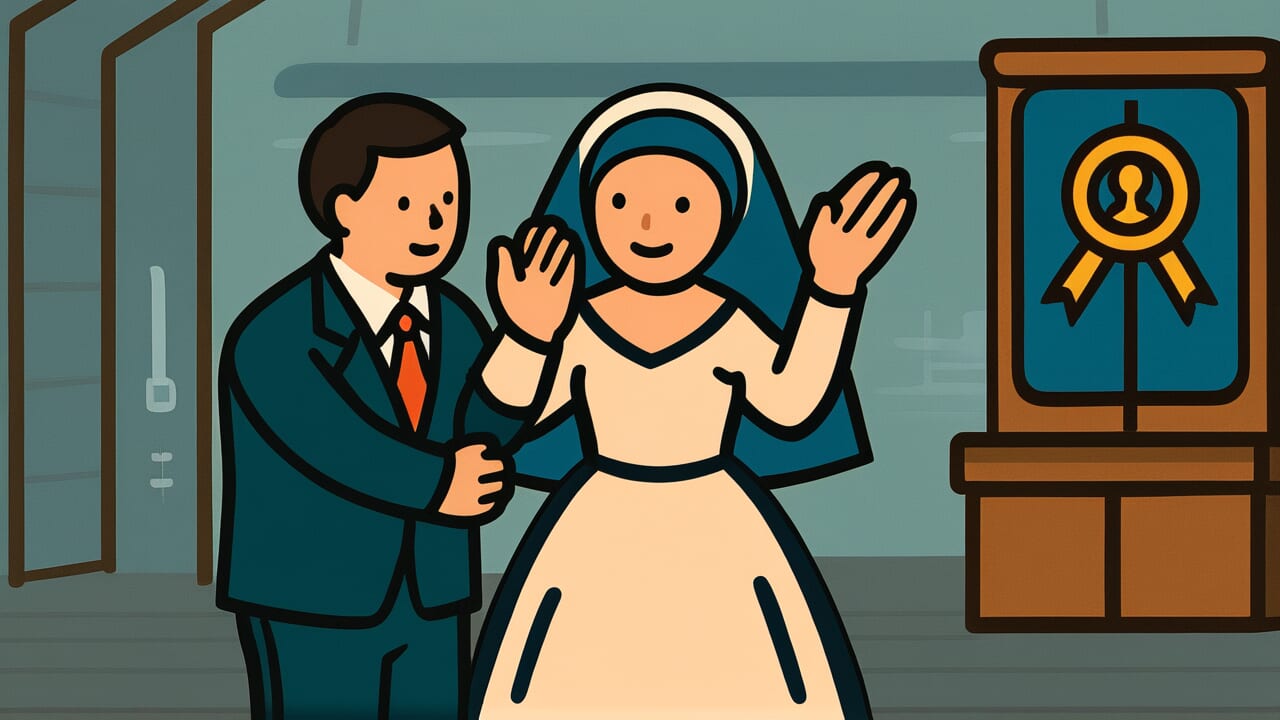How to Read “Commend a wedded life, but keep thyself a batchelor”
Commend a wedded life, but keep thyself a batchelor
kuh-MEND uh WED-ed lyf, buht keep thy-SELF uh BACH-uh-ler
The word “batchelor” is an old spelling of “bachelor.” The phrase “thyself” means “yourself.”
Meaning of “Commend a wedded life, but keep thyself a batchelor”
Simply put, this proverb means you can praise marriage as a good thing while choosing to stay single yourself.
The literal words tell us to speak well of married life. At the same time, we should remain unmarried. This creates an interesting contradiction that many people understand. You can see the benefits of something without wanting it for yourself.
This wisdom applies to many situations today. Someone might encourage friends to get married while enjoying single life. A person could support their siblings’ relationships while preferring independence. People often recognize that different choices work for different individuals.
What makes this saying interesting is its honest approach to personal choice. It acknowledges that marriage has real benefits worth praising. However, it also respects the value of remaining single. This balanced view helps people avoid feeling guilty about their lifestyle preferences.
Origin and Etymology
The exact origin of this proverb is unknown, though it appears in various forms in English literature from several centuries ago. The old-fashioned spelling and grammar suggest it comes from an earlier period of English. Many similar sayings about marriage and single life existed during those times.
During earlier centuries, marriage carried different social and economic meanings than today. People often married for practical reasons like financial security or family alliances. However, some individuals still chose to remain single despite social pressure. This created tension between personal preference and social expectations.
The saying likely spread through oral tradition and written works over time. As English evolved, the spelling changed from “batchelor” to “bachelor.” The core message remained the same across generations. People continued to find wisdom in the idea of respecting marriage while choosing different paths.
Interesting Facts
The word “bachelor” comes from Old French “bacheler,” originally meaning a young knight or apprentice. Over time, it shifted to mean an unmarried man. The word “commend” derives from Latin “commendare,” meaning to entrust or praise something to others.
This proverb uses the old English form “thyself” instead of “yourself.” This formal language was common in earlier centuries when many proverbs were recorded. The structure creates a memorable contrast between giving advice and following it.
Usage Examples
- Uncle to nephew: “Sure, your cousin seems happy with his new wife, but take your time deciding – commend a wedded life, but keep thyself a batchelor.”
- Older brother to younger brother: “I’m glad our friends found love, though I’m in no rush myself – commend a wedded life, but keep thyself a batchelor.”
Universal Wisdom
This proverb reveals a fundamental truth about human nature: we can genuinely appreciate something without wanting it for ourselves. This wisdom addresses the complex relationship between social approval and personal choice. Throughout history, people have faced pressure to follow paths that others consider ideal.
The saying touches on our ability to hold multiple perspectives simultaneously. We can understand why marriage works well for many people while recognizing it might not suit us. This mental flexibility allows us to support others without betraying our own needs. It also helps us avoid the trap of criticizing things simply because we choose differently.
At its core, this wisdom recognizes that life offers multiple valid paths. What brings happiness to one person might feel restrictive to another. The proverb suggests that mature individuals can celebrate others’ choices while staying true to themselves. This balance requires both self-knowledge and respect for different ways of living. It acknowledges that social harmony doesn’t require everyone to make identical choices.
When AI Hears This
Society works like a hidden marketplace where people trade different roles. Some individuals promote marriage while staying single themselves. They get social stability without personal commitment costs. Meanwhile, married couples create that stability but need flexible single people. This creates a secret partnership that benefits everyone involved.
This pattern reveals how humans naturally divide social labor without planning it. People instinctively know they can support systems without joining them personally. The bachelor praising marriage isn’t lying or being fake. He genuinely values what marriage creates for society. He just optimizes his own position within that same system.
What fascinates me is how this looks like cheating but actually strengthens communities. The person avoiding marriage while praising it becomes a social glue. They connect different married families and provide flexible help when needed. Their freedom depends on others’ commitment, creating beautiful invisible cooperation. Humans master this balance without even realizing their genius.
Lessons for Today
Living with this wisdom means developing the ability to separate appreciation from personal desire. This skill helps in many areas beyond marriage and relationships. Someone might praise a friend’s career choice while pursuing a completely different path. A person could admire a lifestyle they have no interest in adopting.
The challenge lies in maintaining this balance without seeming hypocritical. People sometimes question why someone would praise what they don’t choose. The key is understanding that recognizing value doesn’t mean claiming ownership. We can appreciate art without becoming artists, respect athletes without playing sports, and support marriages while staying single.
This approach creates stronger relationships and reduces unnecessary conflict. When we can genuinely celebrate others’ choices, we build trust and goodwill. At the same time, staying true to our own path prevents resentment and regret. The wisdom encourages both generosity toward others and honesty with ourselves. This combination leads to more authentic relationships and greater personal satisfaction.



Comments